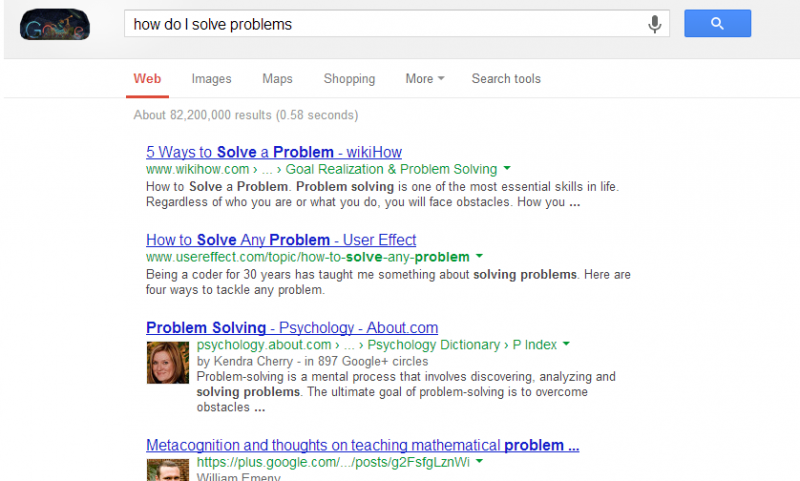
It seems that a new habit has formed in our society, at least among people in our society who are net-savvy. Whenever anyone, anywhere, has a problem, the first way they almost always search for a solution is with an Internet search engine.
Think of the implications. Instead of wondering how to solve something and puzzling through the solution on our own, people would rather search for a solution that someone else created. Where’s the discovery and innovative thinking in this solution path? How likely is it that you will come up with a different solution to a problem if you read someone else’s solution first? How is this a thinking activity?
Here is an alternate proposal. For the biggest problems you encounter (or alternatively, the ones most within your area of expertise), do your best to solve the problem, figure out the issue, or find a solution on your own. Now search for solutions that other people have created. If your solution differs from the solutions you find, even if it is just a partial solution, write about it to let other people know about your thinking. We should all make an effort to contribute more to what is known about how our world works.
I do not mean that we should stop searching for information online. There is an enormous wealth of information online, and you would be foolish to ignore it completely. The small everyday problems like "where is the nearest shoe store" or "how do I tie a tie" are probably most easily solved with a simple search. It is the more complicated problems that we should all try and solve ourselves first, even if we struggle with it a bit, since this is where our own personal growth comes from.
Beth says:
I so agree! Rather than sit with a problem for a while and try a few strategies first the knee-jerk reaction to any problem or question is to “Google it”. I’ve also become frustrated in how the easy access to Google now stunts conversations. Remember how rich even casual conversations use to be as the group struggles to recall the name of a movie, or where a quote was from, or some sports statistic etc etc. Struggling to access some random bit of trivia from the remote regions of the brain was not only challenging it was also fun as we came up with related random factoids. Now, someone pulls out their phone and finds the answer to the problem/question at hand thus squashing any more conversation (or thinking).
August 12, 2013 — 4:24 pm
David Wees says:
I have definitely seen that problem as well. Sigh. The process (the rich conversation) is sometimes more important than the result (the information distributed via the conversation).
August 12, 2013 — 4:46 pm
elizabeth says:
Found this at salon.com and thought of your post:
http://www.salon.com/2013/08/18/how_google_flushes_knowledge_down_the_toilet/
August 18, 2013 — 8:29 pm
Blue says:
I like the careful distinction of googling day to day information vs. challenging problems that make one think. I also remember fun conversations trying to recall fun facts as a group. Though I still search for plenty of things online lately I’ve sometimes tried to not do it until after a conversation or after I have struggled with something a bit. I also feel glad I resisted the urge to google the answer to a riddle and struggled through it instead.
August 20, 2013 — 5:41 pm
Me myself and I says:
I’ve found the internet most dangerous in searching for answers regarding my faith in God. I recently stepped into slippery rocks by seeing what the “experts” thought. I’ve almost lost my faith.
May 24, 2017 — 11:49 am